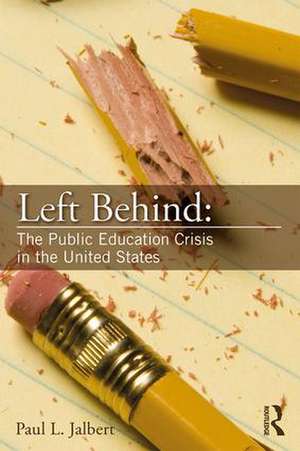Left Behind: The Public Education Crisis in the United States
Autor Paul Jalberten Limba Engleză Paperback – 10 mai 2018
| Toate formatele și edițiile | Preț | Express |
|---|---|---|
| Paperback (1) | 370.71 lei 6-8 săpt. | |
| Taylor & Francis – 10 mai 2018 | 370.71 lei 6-8 săpt. | |
| Hardback (1) | 1005.01 lei 6-8 săpt. | |
| Taylor & Francis – 10 mai 2018 | 1005.01 lei 6-8 săpt. |
Preț: 370.71 lei
Nou
Puncte Express: 556
Preț estimativ în valută:
70.96€ • 77.10$ • 59.64£
70.96€ • 77.10$ • 59.64£
Carte tipărită la comandă
Livrare economică 21 aprilie-05 mai
Preluare comenzi: 021 569.72.76
Specificații
ISBN-13: 9781138091825
ISBN-10: 1138091820
Pagini: 332
Dimensiuni: 156 x 234 x 20 mm
Greutate: 0.48 kg
Ediția:1
Editura: Taylor & Francis
Colecția Routledge
Locul publicării:Oxford, United Kingdom
ISBN-10: 1138091820
Pagini: 332
Dimensiuni: 156 x 234 x 20 mm
Greutate: 0.48 kg
Ediția:1
Editura: Taylor & Francis
Colecția Routledge
Locul publicării:Oxford, United Kingdom
Public țintă
Postgraduate and UndergraduateCuprins
Preface: A Challenging Philosophy of Education
Introduction: The Crisis in Public Education
1. The "Right" to Education
2. "The Free Press"—on a corporate leash!
3. The Business Model
4. A Political Economy of Education
5. Poverty: the perennial problem
6. Discrimination: some structural suspects
7. The Teaching Profession
8. The Mismeasure of Students
9. What our children do not learn in high school, but should
10. "What? I need to learn a second language?"
11. Cultural Arrogance
12. Orwell’s nightmare achieved: the "Colonization of the Mind" vs. Critical Thinking
Postscript: What to do?
Appendix: "Plyometrics" Movement Program
Index
Introduction: The Crisis in Public Education
1. The "Right" to Education
2. "The Free Press"—on a corporate leash!
3. The Business Model
4. A Political Economy of Education
5. Poverty: the perennial problem
6. Discrimination: some structural suspects
7. The Teaching Profession
8. The Mismeasure of Students
9. What our children do not learn in high school, but should
10. "What? I need to learn a second language?"
11. Cultural Arrogance
12. Orwell’s nightmare achieved: the "Colonization of the Mind" vs. Critical Thinking
Postscript: What to do?
Appendix: "Plyometrics" Movement Program
Index
Notă biografică
Paul L. Jalbert is Associate Professor Emeritus of Communication at the University of Connecticut, USA, and editor of Media Studies: Ethnomethodological Approaches.
Descriere
This book addresses the problems that plague America’s elementary, secondary and higher education schools, examining questions of racial discrimination, funding and the connection between poverty and educational outcomes. Challenging the role of the mass media in much that is wrong in education, it criticises the ethnocentric approach to education in the US. Left Behind seeks to replace complacency with critical thinking and explores the possibilities that exist for rebuilding a viable nation-wide education institution, in which ‘what is best’ is decided collectively, not by business entities, politicians and the professional class, but by ordinary people and those working in education.
